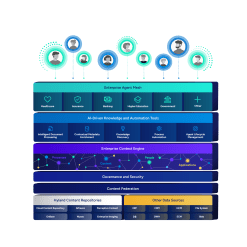Using RegTech to amplify risk management strategies for financial services
Banks, credit unions and wealth management firms must keep up with the constantly evolving regulations — but what kind of technology gets the job done?

Harness the power of a unified content, process and application intelligence platform to unlock the value of enterprise content.
Learn more
Automate your document-centric processes with AI-powered document capture, separation, classification, extraction and enrichment.
Learn about Hyland IDPIt's your unique digital evolution … but you don't have to face it alone. We understand the landscape of your industry and the unique needs of the people you serve.
 Overview of industries
Overview of industries
Countless teams and departments have transformed the way they work in accounting, HR, legal and more with Hyland solutions.
 Overview of departments
Overview of departments
We are committed to helping you maximize your technology investment so you can best serve your customers.
 Overview of services
Overview of services

Discover why Hyland is trusted by thousands of organizations worldwide.
Hear from our customers
Our exclusive partner programs combine our strengths with yours to create better experiences through content services.
Overview of partners
Join The Shift newsletter for the latest strategies and expert tips from industry leaders. Discover actionable steps to stay innovative.
Register now
Hyland connects your content and systems so you can forge stronger connections with the people who matter most.
Learn about HylandWith our modern, open and cloud-native platforms, you can build strong connections and keep evolving.
 Dig deeper
Dig deeper
Compliance obligations are about to escalate.
As the financial services industry moves more and more toward operating at optimal digitization, we expect regulatory expectations will increase as well, and with them — the risk of being noncompliant and of missing important data that could identify criminal activity.
The immense amount of data coming in requires heightened protection, enhanced reporting and a plan for digitized risk management.
The answer: Regulatory technology (RegTech).
RegTech makes regulatory compliance more manageable and accelerates digital optimization and business growth; when deployed, it strengthens risk management efforts and can be used to:
According to McKinsey, majority of [bank] institutions had not sufficiently invested in their technology infrastructure and risk management capabilities – putting them in a ‘technology risk debt’ relative to their needs.
RegTech isn’t the new Fintech, but it is an evolution of the concept.
The financial industry has used Fintech to describe technologies that automate and improve financial services while delivering value to customers and members.
Fintech has been around since the early days when the ATM and online banking were just taking off.
More recently, Fintechs are transforming the financial services industry with digital lending platforms like Borrowell. Independent digital banks like Chime and Moven — which use cutting-edge technologies like face and voice biometrics, chatbots and artificial intelligence — are leveraging tech to attract and retain digital-savvy customers.
RegTech both builds on and goes beyond Fintech innovations by focusing on risk management and compliance concerns to better predict risks and threats to financial services organizations.
It uses increasingly “smart” technologies like predictive analytics, artificial intelligence, machine learning and natural language processing to evolve data security challenges, meet new privacy regulations and achieve regulatory compliance.
A risk management strategy grounded in RegTech minimizes risk by applying innovative technology to all the content a bank, credit union or wealth management firm is responsible for.
It does this by automating compliance, then aggregating the data gained in that effort to devise risk metrics. Once deployed, RegTech for risk management:
Concerning fraud rates, growing cybersecurity threats and exponential growth in the volume of digital data managed by financial firms combine to paint a clear picture: A technology-enabled risk management strategy is the only way for firms to keep up.
Without a RegTech solution to provide both proactive risk management and reactive compliance enforcement, financial firms face vulnerabilities from slow incident responses to escalating costs and audit challenges.
Still not sure RegTech would directly impact your firm? Common applications for the solution empower your team to:
Identify patterns of irregularity that are indicative of fraud, both internally and externally
RegTech acts as an early warning system that allows organizations to identify potential threats and act quickly to thwart them. This includes insider trading, suspicious activity, digital identity verification, conflicts of interest and insider-threats such as an unchecked culture of poor policy-and-procedure adoptions or malicious individual actions.
Conduct flawless audits
RegTech helps the audit process by logging every user access, as well as the edits and document actions taken; by enabling audit log reviews; and by allowing businesses to configure the system to make audit- appropriate content available to external auditors.
Stay informed of new regulatory requirements and keep up with changes to existing ones
Regulatory change management presents a significant burden for organizations, both in the cost of compliance and the resources necessary to demonstrate that compliance.
Effectively manage document retention
RegTech automates the costly, time-consuming document management work required to stay compliant, so the entire process from creation to destruction is done at the right time and applied automatically to all content in your system.
Ensure customer experiences are safe, secure and compliant
RegTech improves compliance and escalates fraud activity, which benefits both your internal team members and your customers or members. Automated processes around the lifecycle of personal data protect your customers and your business reputation, allowing you to focus on accelerating growth.
Scale to meet the massive data requirements of the digital world
RegTech creates efficiencies at scale so back-office operations and regulatory teams can meet the obligations quickly, accurately and easily. With the velocity and volume of data coming into a digitally enabled enterprise, RegTech enables firms to infuse visibility into their compliance processes.
At its core, the promise of RegTech is to make risk management and regulatory compliance more effective and efficient.
When done right, it helps financial firms stay competitive in the marketplace, making it an accelerant for innovation and growth.
Hyland, a leading content services provider, helps more than 3,500 banks, credit unions and wealth management firms across the globe increase competitiveness, growth and profitability. More than half of Fortune 100 companies leverage our products and solutions to achieve their goals.